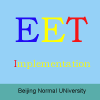-
Knowledge Management
普通类 -
- 支持
- 批判
- 提问
- 解释
- 补充
- 删除
-
-
Knowledge Management
COMPETITIVE ADVANTAGE is what companies seek by using Knowledge Management, or KM as it is known. The basic idea behind KM is to collect what is known in an organization about process, procedures, data, know how, and experience and transform these into useful knowledge that everyone in the organization can have access from wherever they are and at the level they need it.

According to Brandenburg & Binder (1992) "KM refers to strategies and processes for using knowledge to enhance competitive advantage or support professional communities." Many big organizations are using technology to help develop KM projects. However technology alone does not do the job, it requires knowledgable people -- usually performance technologists -- to conduct the front-end analysis in order to capture, filter, and document only the useful information (knowledge that supports important job functions). The main purpose of KM is to increase productivity based on efficient performace support (useful knowledge).-
Guidelines for Knowledge Management Projects
According to Brandenburg and Binder (1992) people within organizations can add value to a KM project in different ways:
Setting up standard classifications for knowledge, establishing key words, and building an index to facilitate searching.
Organizing information as it enters the system (Information sources may be end users, groups, and so forth).
Defining templates for report documents based on end user performance requirements.
Monitoring and maintaining different kinds of standards.
Transforming information into knowledge by creating documents and by capturing information from existing documents and other sources.-
Knowledge Management's Iterative Process

Other considerations:
KM is more powerful when it addresses specific needs in a particular performance domain (for example, sales and marketing management)
Rosenberg (1999) affirms that knowledge should be delivered in the easiest possible way, and it also has to have value for the users. Otherwise few will attempt to use the system for improving their own performance.
The message must be situated in the correct place before it has value.-
Where is the value of Knowledge Management ?
Since the world of business has been affected by technology, the rate of rollouts and changes is increasing. Companies now are paying more attention to the value of the knowledge that people have. The new organization's agility requires its members to continue learning in order to keep up with the competition. Companies need to reduce the response time when unexpected changes occur.
"Knowledge is power itself"
Francis Bacon-
Where can I learn more about KM ?
www.brint.com is a site where you can find information about Knowledge Management and links to external resources.-
Author
Jose Moreno
Graduate Student
San Diego State University -
-
- 标签:
- performance
- management
- documents
- information
- value
- knowledge
-
加入的知识群:



学习元评论 (0条)
聪明如你,不妨在这 发表你的看法与心得 ~